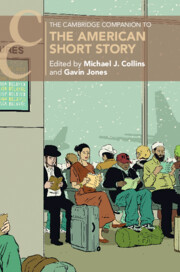Book contents
- The Cambridge Companion to the American Short Story
- The Cambridge Companion to the American Short Story
- Copyright page
- Contents
- Figures
- Tables
- Contributors
- Chronology
- Introduction
- Part I Contexts
- Part II Histories
- Chapter 7 The War Story
- Chapter 8 Narratives from Below
- Chapter 9 The Short Story and the Popular Imagination
- Chapter 10 Love What You Do
- Chapter 11 Local Color to Multiculturalism
- Part III People and Places
- Part IV Theories
- Notes
- Further Reading
- Index
- Cambridge Companions to…
- References
Chapter 10 - Love What You Do
Neoliberalism, Emotional Labor, and the Short Story as a Service
from Part II - Histories
Published online by Cambridge University Press: 11 May 2023
- The Cambridge Companion to the American Short Story
- The Cambridge Companion to the American Short Story
- Copyright page
- Contents
- Figures
- Tables
- Contributors
- Chronology
- Introduction
- Part I Contexts
- Part II Histories
- Chapter 7 The War Story
- Chapter 8 Narratives from Below
- Chapter 9 The Short Story and the Popular Imagination
- Chapter 10 Love What You Do
- Chapter 11 Local Color to Multiculturalism
- Part III People and Places
- Part IV Theories
- Notes
- Further Reading
- Index
- Cambridge Companions to…
- References
Summary
This chapter discusses story collections by George Saunders, Charles Yu, Kwame Nana Adjei-Brenyah, and Mary South. These collections tell stories set in the neoliberal workplace, with a focus on emotional labor, pink-collar jobs, and the service economy. Constructing a genealogy of American writers who have written about service work, this chapter argues that contemporary short story writers have developed a unique perspective on the relationship between the short story and the market. Previous writers have either embraced writing short stories to satisfy the demands of the market, or have seen writing stories for the market as a kind of selling out. Contemporary writers of what this chapter calls “the Short Story as a Service” ask, instead, what it means to write stories in a neoliberal world that valorizes the figure of the artist and that describes service work as a kind of creative writing.
- Type
- Chapter
- Information
- The Cambridge Companion to the American Short Story , pp. 160 - 173Publisher: Cambridge University PressPrint publication year: 2023

